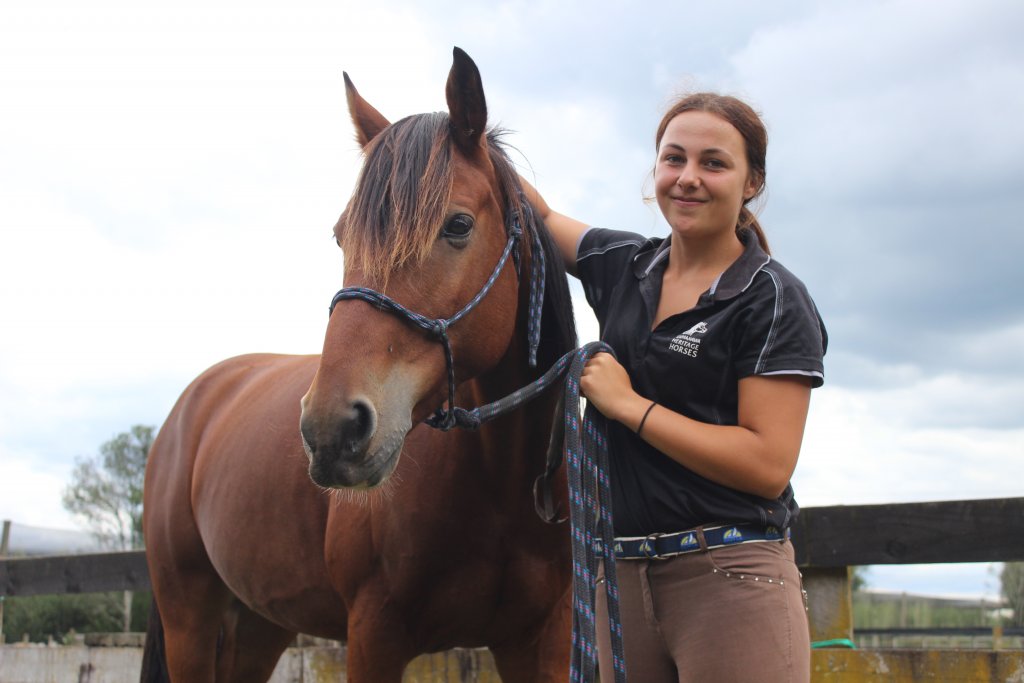
Georgia Bouzaid, a sponsored showjumping rider for Kaimanawa Heritage Horses, hopes people will sign up to take in a Kaimanawa horse from the 2019 muster and help save them from a bleak future.
Georgia Bouzaid loves her “cheeky little pony”, an eight-year-old Kaimanawa pony which lived in the wild up until the 2014 Kaimanawa muster.
She’s spent the past three showjumping seasons aboard Redcliff’s Bill as a sponsored Kaimanawa rider, making placings at almost every weekend competition from September through to April.
Now she’s encouraging those who can to sign up to adopt a pony from the 2019 Kaimanawa muster to do so as soon as possible, as applications close this Sunday, April 7.
The future for horses that can’t find a new home is rather bleak.
“He’s been so consistent with me over the time that I’ve had him,” the 16-year-old St Peter’s student said. “You always feel safe on him, you know that he’s going to go out there and not going to give up on you, he really wants to do it.”
Fresh from the wild, Redcliff’s Bill was trained by Kate Hewlett for the first Stallion Challenge at Equidays in 2014. His excellent performance and attitude saw him become an ambassador for the breed, and 2017 he and Georgia took out the top place in the JLT Pony 6 Bar at Equidays.
He first went to live with Georgia on Waiheke Island, but as they continued to top the showjumping circuit mum Kelly Bouzaid made the call to move to Cambridge 18 months ago, providing a more central location for competitions.
Bill, as he’s known at home, has continued to have many successes with Georgia, including winning the six bar competitions at the Taupo Christmas Classic and at Equidays.
He’s settled in well in Cambridge, nestled in a quiet country home in Kaipaki, enjoying his favourite food, carrots, and time with his two equestrian companions, a young Thoroughbred named Nigel and a Shetland pony called Manni.
“He has a lot of personality, he’s a cheeky monkey, but he’s really good, a lot of fun. He always tries really hard,” said Georgia.
“There are a few (ponies) born to Kaimanawas that have gone on to win titles like Pony of the Year, but he’s really the only one born and raised in the ranges to reach this level.”
“He’s a bit of a freak of nature, he sure can jump,” Kelly added. “He’s become a little bit of a celebrity on the circuit too.”
Georgia said she would love to train a wild Kaimanawa for herself one day, but for now she’ll stick to showjumping with Bill.
“They really want to please, they want to do well, you’ve just got to take the time with them,” she explained.
“At the start when you first get them out of the wild they’re going to take time, it’s going to teach you patience, but I think once they trust you, they’ll do anything for you. I guess they don’t know what they’re doing at first, so they’ve got to find someone they can follow. And if they can trust you, you’re going to be that person.
“They’re just great ponies.”

Wild horses’ bleak future…
Throughout this month and next month, seventy-four Kaimanawa wild horses will be mustered out of the Kaimanawa Ranges as part the area’s ecological management strategy.
Kaimanawa Heritage Horses (KHH) is urging applications from those who can provide a home for one or several horses, or anyone interested in sponsoring the placement and upkeep of a horse.
“KHH only has applications for thirty-four horses at this stage,” KHH Chairperson Kimber Brown said last week. “That leaves a lot of horses still in need of caring homes with suitably experienced new owners.”

Wild Kaimanawa horses, pictured during a KHH field trip in 2013. Photo – Kaimanawa Heritage Horses.
KHH Welfare Officer Michele Hautain said the Kaimanawas coming out of the muster are “true wild horses”, but within time they will do anything their owners ask of them.
“In the early days they need sympathetic handling to ensure they make a successful transition to domestic life,” she said. “Kaimanawas have an X-Factor; their senses are acute, and they have proven to be very trainable. Given the right environment they are very curious, honest and friendly and are suitable for a variety of equine disciplines.”
“Any mustered horses which do not find homes face a very bleak future.”
The cost for taking a horse from this year’s muster has been set at $250. KHH is more than happy to offer support and advice to prospective new owners. More information and application forms are available at www.kaimanawaheritagehorses.org and forms can be sent to [email protected]. To speak to the Waikato Area manager directly phone Michele on 0274318082.








